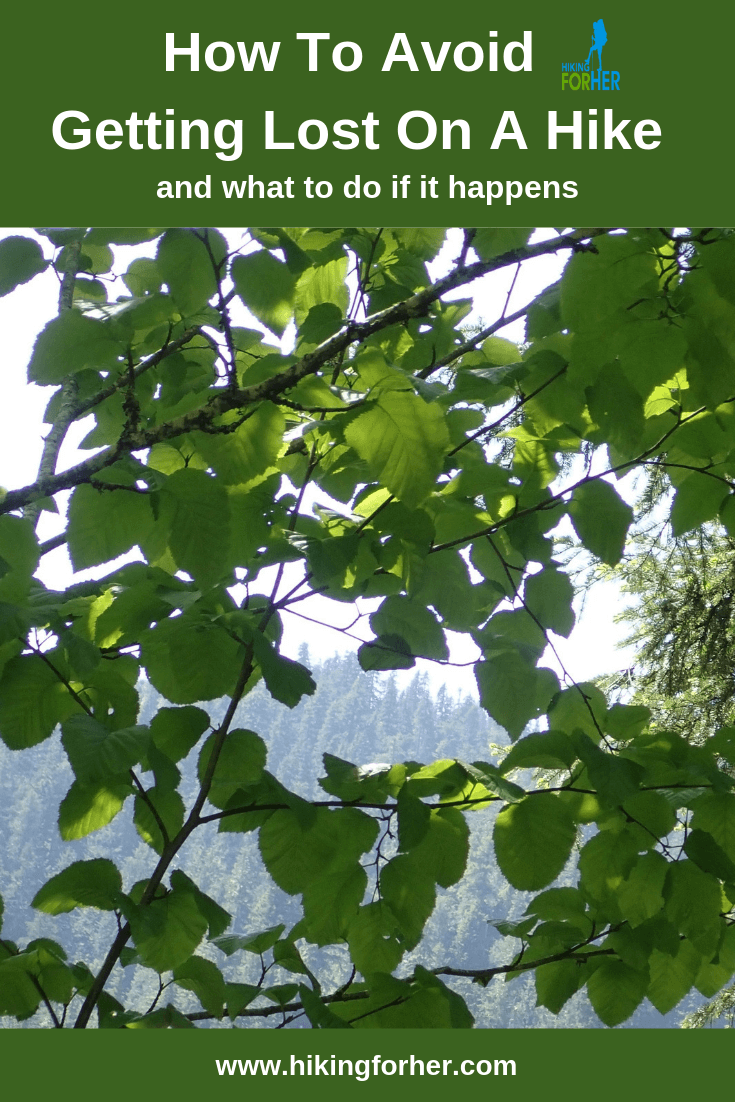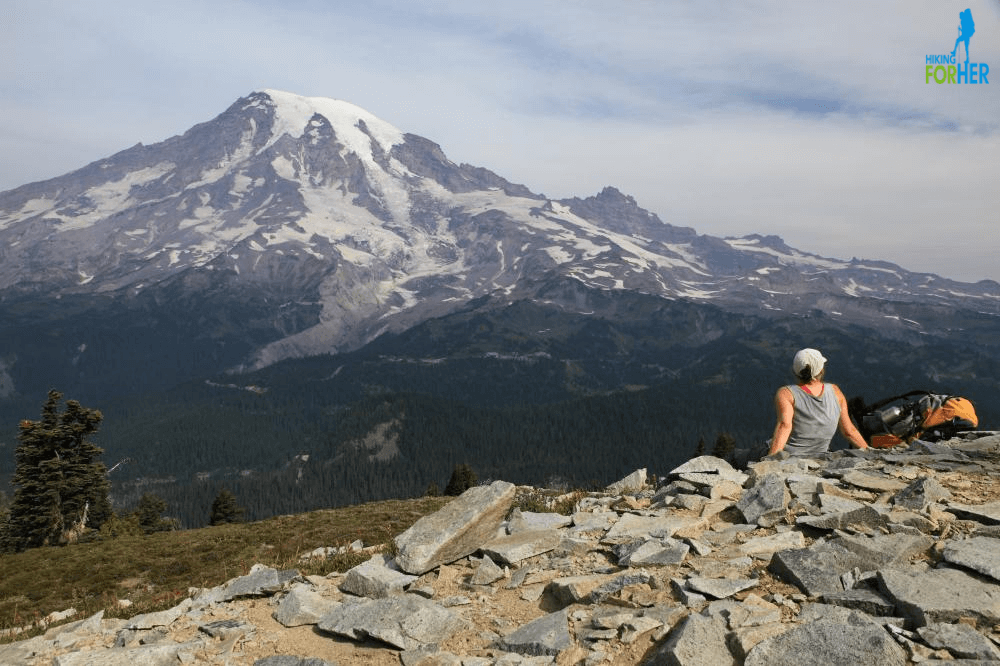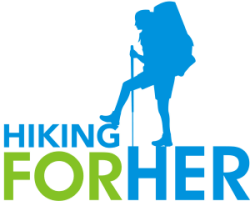
Afraid Of Getting Lost
While Hiking?
Prepare Now To Avoid Panic
By Diane Spicer
For many female hikers, getting lost while hiking is the ultimate fear.
Right up there with bears and snakes on the trail.
Can you relate?
Let's harness fear of getting lost as motivation to do some planning and preparation in case the worst thing happens: you lose the trail or get turned around and don't know where you are.
Some statistics about hikers
who manage to get themselves lost
As you read this, you're probably comfortable, dry, well rested and and sipping a cup of something delicious (just me?).
So it's easy enough to blame the victim, or promise yourself that you'll never be stupid enough to get lost while hiking.
Look at the following statistics, though.
- People every bit as smart and savvy as you and me get lost every day.
Self reported reasons why
hikers got lost
The source for the following information is an analysis of 100 news reports on reasons hikers became lost while hiking, found at this website.
In order of most common to least likely factors in getting lost:
- wandered off trail
- bad weather
- fell from trail
- separation from group
- hiking injury
- ran out of daylight
- gear failure or loss
The takeaway message is...
All hikers are vulnerable to bad judgement, fickle weather, trail conditions, challenging terrain, mental and physical problems, and just plain bad luck.
Every one of us should be prepared to spend a night, or even a bit longer, outdoors.
If you're a solo hiker, add "alone" to that sentence.
So let's get prepared for the unfortunate but not impossible scenario of being lost, vulnerable, and unable to find the way back to the trailhead under our own power.
We'll divide what to do if lost while hiking into the three phases of a hike.
Skip down to the section you're most interested in, with these links:
- Before you leave for the trailhead
- During your hike
- Once you realize that you're lost while hiking
What to do
before you leave your home
to prevent getting lost while hiking
There are three areas to concentrate on to become a prepared, safe hiker:
- Ten Essentials
- navigation plan
- survival gear
Run through this overview as a mental checklist, asking yourself if these things are part of your regular routine as you prepare for a hike.
Take note of what's missing, and please be your own best friend by jotting down a quick list of things you need to add to your backpack before your next hike.
Sometimes it's the little things that can make or break you on the trail.
Essentials for all hikers
As a hiker, you're prepared to shoulder the responsibility of taking care of yourself on the trail.
That's why you have a backpack on your shoulders.
- It's your pharmacy, kitchen, hydration center and survival gear repository, all in one.
In the backpack, the Hiking Ten Essentials take up the most room (complete list and discussion here).
You also have a survival kit, like this one, so you can start a fire and care for your immediate needs, if you're forced to overnight on or near the trail.
And you always carry a basic first aid kit stocked with pain relief, minor wound care and other essentials, like this one.
- Yes, it's on the Ten Essentials list, but it's so important that I'm calling it out again.
If this sounds like overkill for "just a quick little day hike", stop reading this.
- You're not going to believe anything else on this page.
I hear the School of Hard Knocks is open for enrollment :/
Navigational aids to use
before you get lost while hiking
Are you a hiker who loves the spontaneity of jumping in the car and heading out to a trailhead you've just read about that morning?
Not cool.
You should be deliberate about picking a day hike, based on your physical abilities, favorite type of destination, and trail conditions.
And you need maps!
Look at the correct topographical map for your intended hike, and note the terrain:
- Number of stream crossings
- Junctions or trail offshoots
- Distance and elevation gain/loss
If you have map and compass skills, bring the compass.
If you carry a cell phone and intend to use it for navigation, a word of forewarning:
- Relying on a cell phone for navigation is fraught with peril.
- Batteries die, coverage is limited or spotty, unforgiving rocks are merciless when a phone is dropped... don't put your safety in this particular basket without a backup plan.
Phone questions for you:
If you're using a GPS app on your cell phone, is the phone fully charged?
Are you using airplane mode during the hike to conserve battery life?
Do you know exactly how to use the app?
Do you have a backup, old school paper map & compass with you?
Do you have a mental map of your route as a self check to what the app is telling you?
Gear for overnight or longer term survival
if you get lost while hiking
The Ten Essentials list (see link above) covers basic necessities for a hiker who needs to stay outdoors longer than planned, like extra clothing, food and water.
But it doesn't mention things that you can use when you get lost on a hike.
Here's a short list to consider, based on what I carry myself:
- lightweight, waterproof tarp
- trekking poles to use for creating a shelter
- signalling device like this mirror or whistle or bright bandana
- personal locator beacon (especially if you solo hike) ...
- ... or a satellite messenger
- simple, lightweight water filter like a LifeStraw (review here)
- super lightweight Mylar blanket like this one
- a heavy duty trash bag and a few resealable plastic bags stashed at the bottom of your backpack
- laminated cards of wild edibles in your region, like these
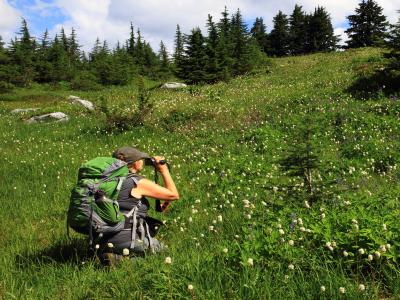 Yes, all of that is stashed in my backpack!
Yes, all of that is stashed in my backpack!
Check the weather forecast
Hiking weather changes rapidly, so don't fall victim to a sudden storm that traps you when a bridge washes out or tree limbs block your navigation.
A long term forecast can give you a general sense of what you're going to face on the trail.
But double check the forecast on the day you leave for the trailhead.
Read about the best places to access accurate weather forecasts here.
Share your trip itinerary
Now that you know where you're going, how long you plan to be gone, where you will access the hiking trail, and where the route will take you, share that information with someone you trust.
For multiday adventures, leave a copy of your hiking itinerary in the vehicle you park at the trailhead.
Sometimes you need to file a trip plan with authorities.
- Don't overlook this in your planning phase, as grumpy rangers can ruin your whole day (and you just might ruin theirs when you get lost).
Now let's get you on the trail.
Do these things as you hike
to prevent getting lost
Simple habits and behaviors will keep you on the right trail, headed in the direction you intend to travel:
- Always sign a trail register if one is available, as it leaves a big clue about your hiking plans for a rescue team or family member.
- Watch for the landmarks you identified before you got on the trail: water crossings, trail splits, cliff faces, number of switchbacks, anything that tells you how far you've traveled.
- Stay alert to changes in the weather, and turn back if conditions become dicey.
- Form this habit: check out what the trail looks like if you are going in the opposite direction, making a mental note of interesting features that catch your eye (oddly shaped tree, a split rock, a patch of bright flowers). Seriously, turn around and let your gaze drink in the way the trail looks from the opposite direction.
- When you reach a trail junction, pull out your map and make sure you're selecting the correct branch. Don't rely on signage (may be outdated, illegible, inaccurate or missing).
- If you choose to step off the trail (pee stop, photo opportunity, a nap), do a 360 degree visual scan first so you can recognize the trail when you return from a different vantage point.
- Leave yourself some sort of unobtrusive but recognizable marker with stones, downed tree limbs, or bent foliage.
More smart trail behavior
to avoid getting lost
If you're hiking in a group, resist the urge to split up to accommodate different hiking paces or preferences.
- Group hiking tips here
Keep track of time and adjust your hiking pace as needed to get back to the trailhead before you lose daylight.
- Adjust your time estimates based on the angle of the sun paired with the density of what's over your head: clouds, tree limbs, rock faces.
Check in with yourself if you begin to feel anxious about the direction you're hiking. If something feels "off", don't ignore it.
- Get out the map, sit down for a snack and some water, and figure out where you might have gone wrong.
- Retrace your steps if you're at all concerned about your direction. This is best done right away, before terrain or weather interfere with your ability to move.
If you realize that you don't know where you are, and don't know how to get back to the trail you came in on, never fear!
Seriously.
Fight the fear and keep reading.
What to do if you get lost
while hiking
Okay, it's show time.
You've prepared for the remote possibility of getting lost.
Now you're definitely turned around and don't know what to do next.
Having been through this scenario, I will tell you that the feeling in the pit of your stomach is sheer terror.
The mind is a powerful story teller, and you will begin to imagine wild beasts, night terrors, starvation, dying of thirst...
If you remember nothing else from this web page, burn this word into your consciousness:
CALMNESS
You will want to DO something. The "fight or flight" adrenaline rush is real.
Fight that urge and channel your inner Zen, even if you think you don't have it. You do!
Sit down, do some controlled breathing, and just feel panic as it saturates your body.
Then realize this:
It's your mind, not your body, that matters at this pivotal moment.
Allow your thoughts to swirl around, then begin to gently guide them into productive channels by asking yourself questions:
- How long ago did I feel confident and not lost?
- What's the last solid landmark I remember seeing?
- How much food and water do I have left?
- Do I have any physical reason to remain right here?
- What time is it, and how much daylight will I have in this exact location?
- Can I easily and safely retrace my steps in my current condition?
- Do I have cell phone coverage? Dial 911 anyway; U.S. law dictates that an emergency message will (eventually) get relayed to the nearest tower.
- How long will it be before the folks holding my itinerary realize they need to summon help?
Use the answers to formulate a decision about staying put, or trying to find your way back to the trail.
Emotions you may feel if
lost while hiking
It's going to be tough not to beat yourself up or chide yourself for making "stupid" decisions.
As with fear, that's an unproductive use of your time.
- Once you're rescued, you'll have a lot of time to cry, wail and replay the events.
So let emotions flow through you, but don't allow them to sweep you away.
You've got more important things to do than weep!
A few more statistics about decisions made
when folks get lost while hiking
Just so you know, the statistics from the report referenced above found that 65% of hikers kept moving.
The rest hunkered down.
Also interesting:
- 77% of the lost hikers were rescued; the rest found a way out on their own.
- Rescue in the United States occurs within 24 hours on average.
So if 65% of people kept moving, and 77% of all hikers had to be rescued, what does that tell you?
Something else to consider in your decision: if no one knows where you were headed, they don't know that you're lost, so there will be no search or rescue.
- That's why we tell people where we're going, right? Right!
Now let's play the "I'm lost" scenario both ways: keep moving, or stay put.
If you decide to move from your location
once you realize you are lost while hiking
Eat and drink something while you formulate a plan.
Be sure you have the physical and mental reserves to keep moving.
If the weather is against you, stay put until it improves.
- Being cold and wet PLUS lost will sap your energy reserves and set you up mentally for failure.
Use the fact that water flows downhill to guide you to roads and habitations - if the terrain allows you to follow it.
Moss grows on the north side of a tree (Northern hemisphere) due to less sunlight, so if you can't determine directions from sunlight or a map, use this basic fact to get a crude sense of direction.
Then use your map to estimate where you are - because you could not possibly have wandered very far off your intended route unless you were setting a blistering pace as SuperWoman.
Once you start moving:
- Check in with yourself, and assess your commitment to moving. Don't do it unless you have full confidence in yourself, or the current conditions are unsafe for you.
Move slowly and deliberately.
If you feel panic begin to overwhelm you again, stop.
- You are in charge of the situation, so don't let yourself down by with hasty decisions.
What to do if you decide to stay put
and wait for rescue
Don't give in to your fears; use them to motivate you to set up a basic camp.
- Locate your headlamp or flashlight in your ten essentials.
- Adjust your clothing layers so you won't work up a sweat that will leave you cold and damp when you rest.
- Focus on the big three: shelter, water and food. Let your physical condition and the weather dictate which one to put first.
Create shelter
You don't need an elaborate shelter, but keep these things in mind:
- Get out of the path of wind and rain to any extent possible, without placing yourself in a hazardous situation from tree limbs.
- Tarp + poles create a dry overhang, and your garbage bag creates a dry floor. (see additions to Ten Essentials above).
- Gather leaves, moss, pine needles, branches and other materials to create a nest for trapping body heat to avoid hypothermia.
- Put on all of your clothing, shielding your head and hands from coldness however possible. That's when a clothing layering system really comes into its own.
- Get creative with that garbage bag in the bottom of your pack: sit on it, wrap it around you, hang it overhead, or fill it with surface water.
- Curl up with your hiking companions to share and recirculate body heat.
- If solo, adopt the fetal position beneath your shelter to capture body heat.
- Don't sleep right next to running water, because its sound will mask rescuers trying to locate you.
- Don't sleep right next to low lying bodies of surface water, as cold air settles and collects there. Brrr!
Hydration is important if lost while hiking
Water is more important than food in the short run.
Once you've got your shelter in place, prioritize hydration so you keep a clear mind and a strong body.
Drink enough to maintain clear, abundant urine output until you run out of water.
If you have access to surface water, and are concerned about water borne illness, know that when push comes to shove, you can always deal with an infection later, once you get rescued.
No surface water?
Ask yourself:
- Is there any moisture trapped in puddles, leaves or moss near you?
- Can you rely on morning dew or rainfall, and trap it on your gear or clothing?
 Water drops collect on plant leaves and can be a source of hydration for you
Water drops collect on plant leaves and can be a source of hydration for you
Nourishment when you're
lost while hiking
Banish the thought of eating grubs for now.
If you haven't done a food inventory, now is the time. What's in your lunch sack?
Carbohydrates will keep you fueled as you create your shelter (see above): crackers, bread, candy, cookies.
High value calories from fats will keep you warm through the night, so save them for when you're going to try to sleep: nuts, cheese.
- One more good reason to stash a few packets of nut butters in your survival kit!
While you wait to be found
Plan how to make yourself conspicuous in the morning when you hear rescuers.
Use these:
- your brightest clothing as a signal flag
- a cleared area where a plane can spot you
- a smoky signal fire (use green leaves and sap filled limbs)
- your colored tarp and/or backpack
- your whistle
If you hear a plane or helicopter, you need to do two important things: move around, and provide color contrast with your environment.
- Wave the brightest thing you have as you sway from side to side in the highest spot, or most cleared area, you can access.
- Flash your mirror or anything reflective skyward.
If you hear voices in the distance, use three blasts on your whistle, timed about a minute apart, to direct attention your way.
- Save your voice until people are close enough to hear your words.
Prepare today
to deal with getting lost while hiking
No way around it, preparation is the key to surviving the scenario of being a lost hiker.
You can blow off a lot of things as a hiker, but failing to prepare to provide for your own safety and comfort is the worst thing to ignore.
While Search And Rescue (SAR) teams are there to help you, you don't want to be the hiker that could have used gear and smarts to figure out her own way back to the trail.
Or avoided being lost while hiking in the first place.
If you are concerned about injury and illness while hiking, these tips will help you face and deal with your fears:
Would you like to learn more about how to survive getting lost while hiking?
REI Co-op runs classes on hiking and camping, including one titled Wilderness Survival.
- Find out more about classes here.
Getting Lost While Hiking: How To Cope With The Fear
|
I get emails all the time about what I wear, eat, carry and love to use on the trail. That's
why I provide affiliate links to you: the best gear that I use myself and have seen used by other hikers is instantly
available for your consideration, and the gear company sends a few
pennies per dollar to this reader-supported hiking website. There is no added cost to you! Everyone ends up a winner: Great gear for you, strong gear companies, and more free hiking tips for everyone. Thanks very much for your support. It's warmly and sincerely appreciated. It also helps send these hiking tips to all your virtual trail buddies around the globe. |
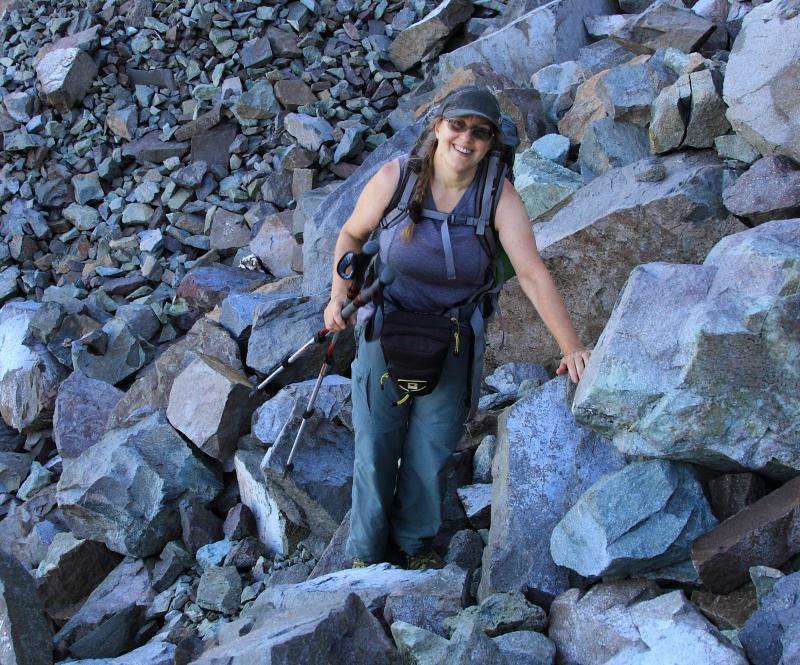 |
